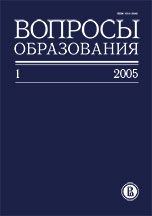Most read articles by the same author(s)
- Evgeny Saburov, Kirill Mitrofanov, Natalia Naidenova, Ekaterina Polivanova, Galina Kovaleva, Неочевидные уроки международного исследования «PISA-2000». Круглый стол , Voprosy obrazovaniya / Educational Studies Moscow: No 1 (2004)
- Yaroslav Kuzminov, Evgeny Saburov, Anatolij Pinskij, David Konstantinovsky, Lev Jakobson, Elena Penskaja, Isak Froumin, Andrei Fursenko, Образование в XXI веке. Тенденции и вызовы , Voprosy obrazovaniya / Educational Studies Moscow: No 1 (2004)
- Evgeny Saburov, Pavel Derkachev, A Cost Calculation Model and the Efficiency of Financing Basic Education Services , Voprosy obrazovaniya / Educational Studies Moscow: No 1 (2006)









